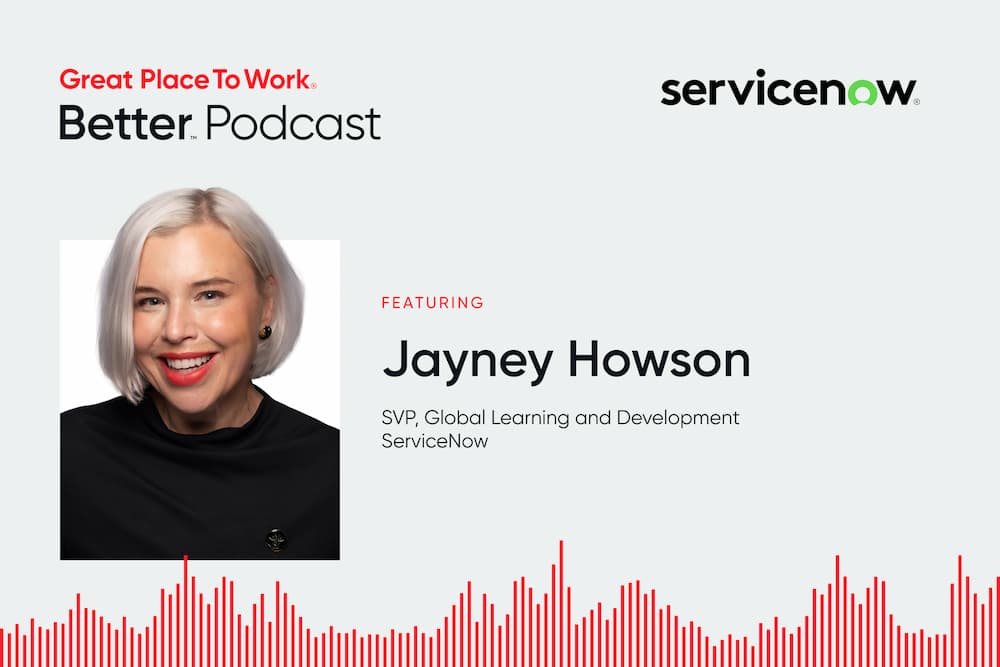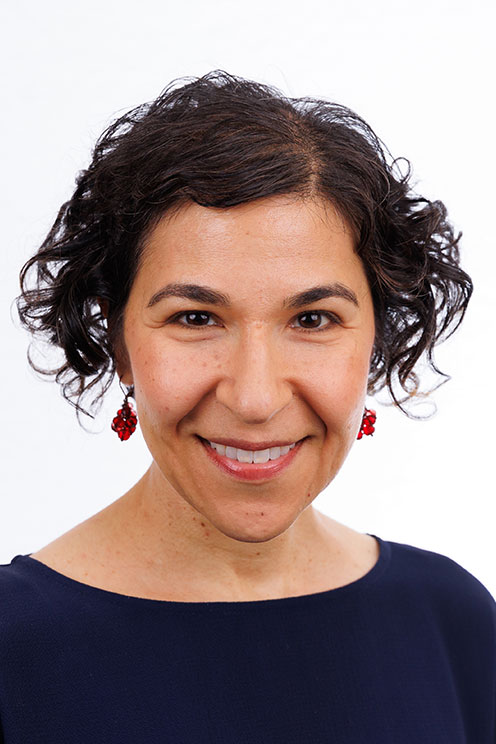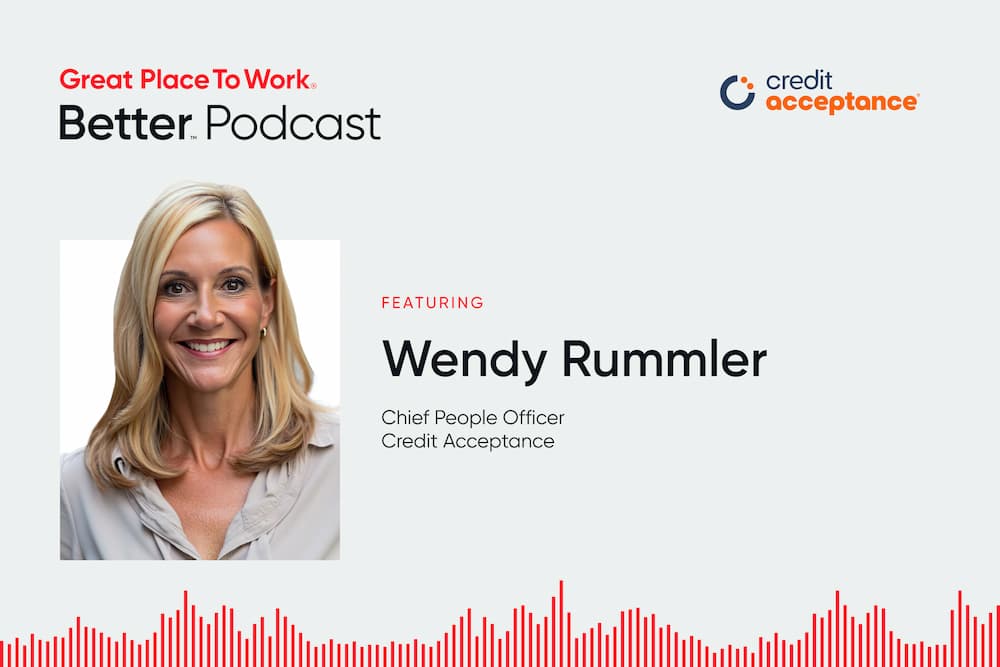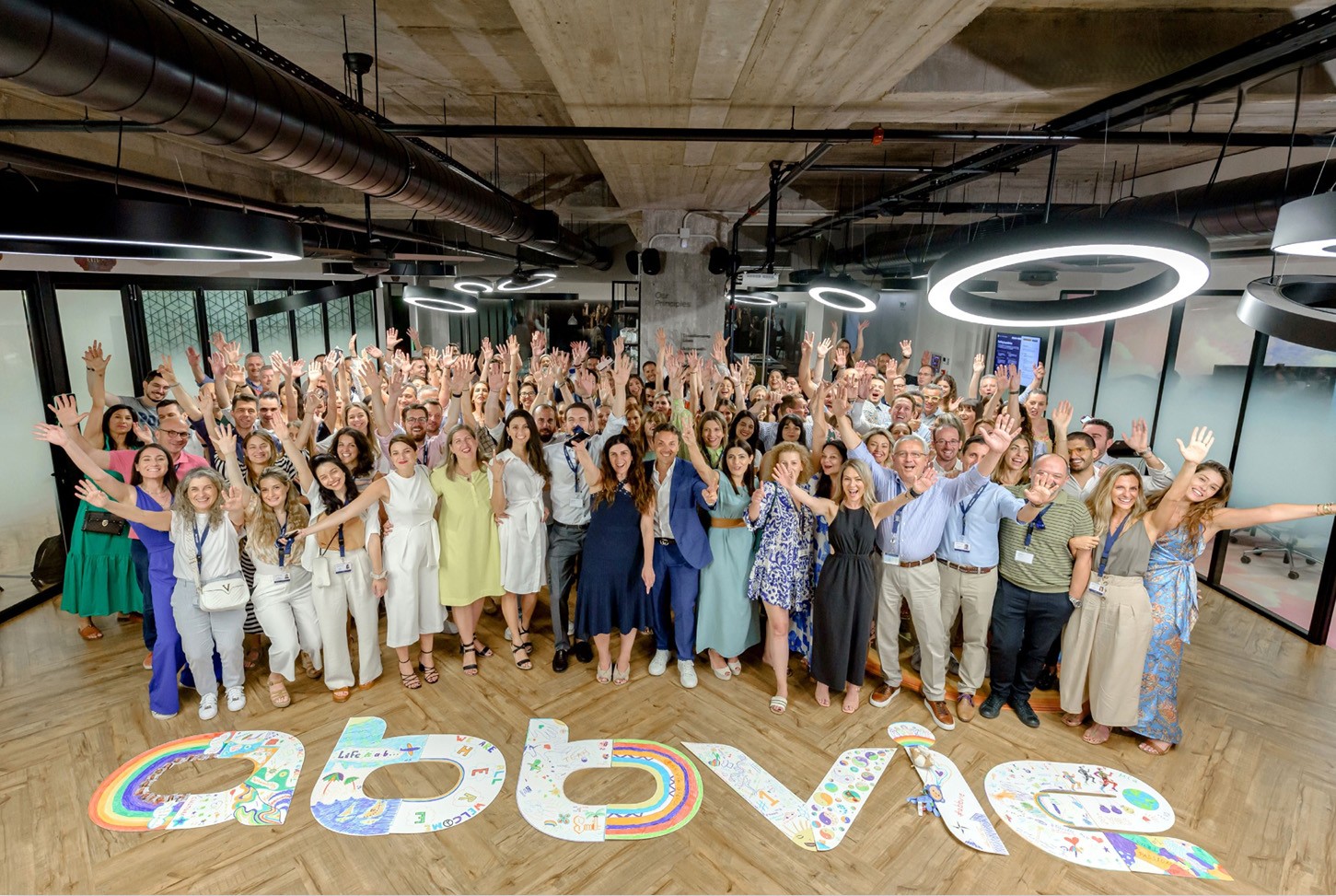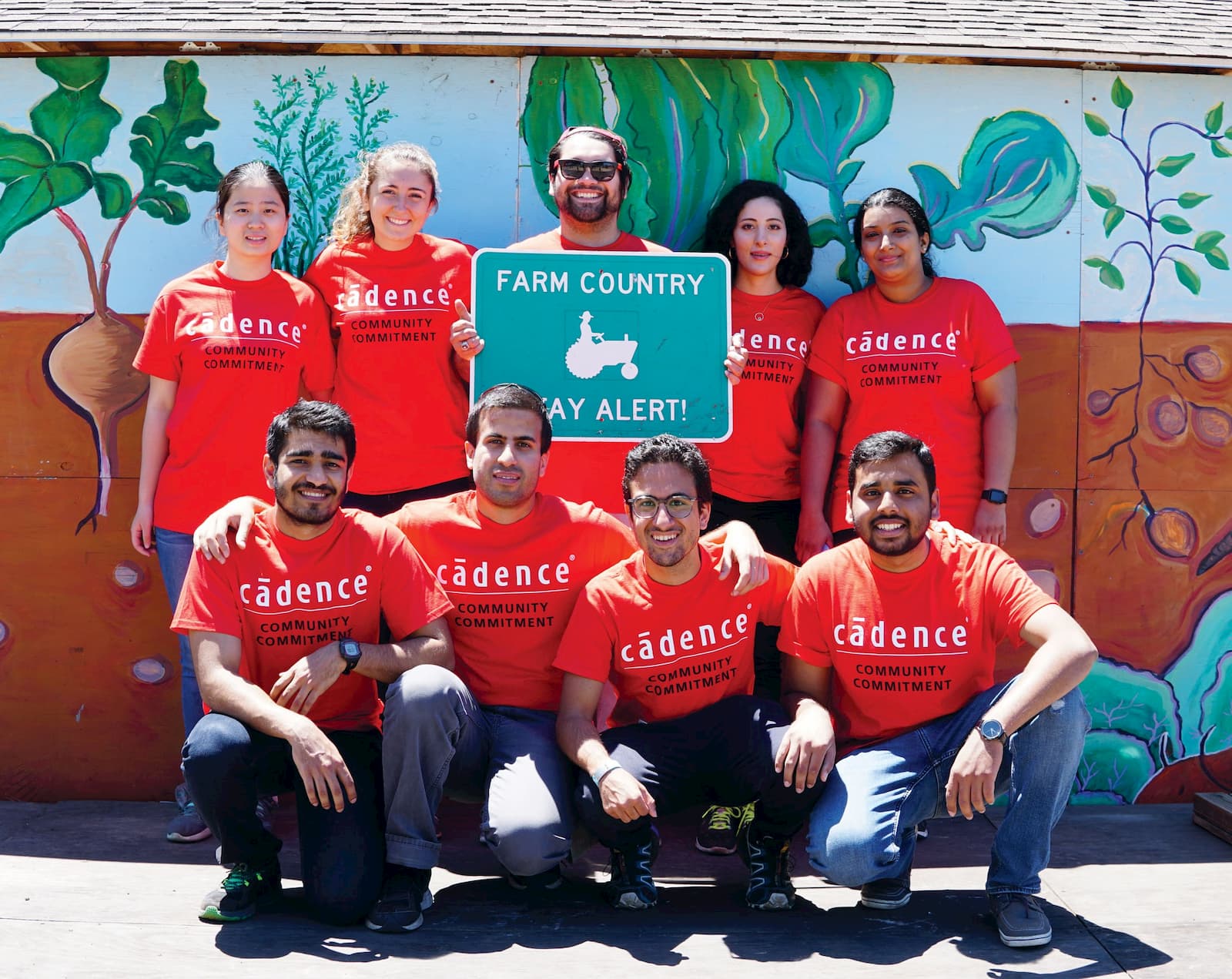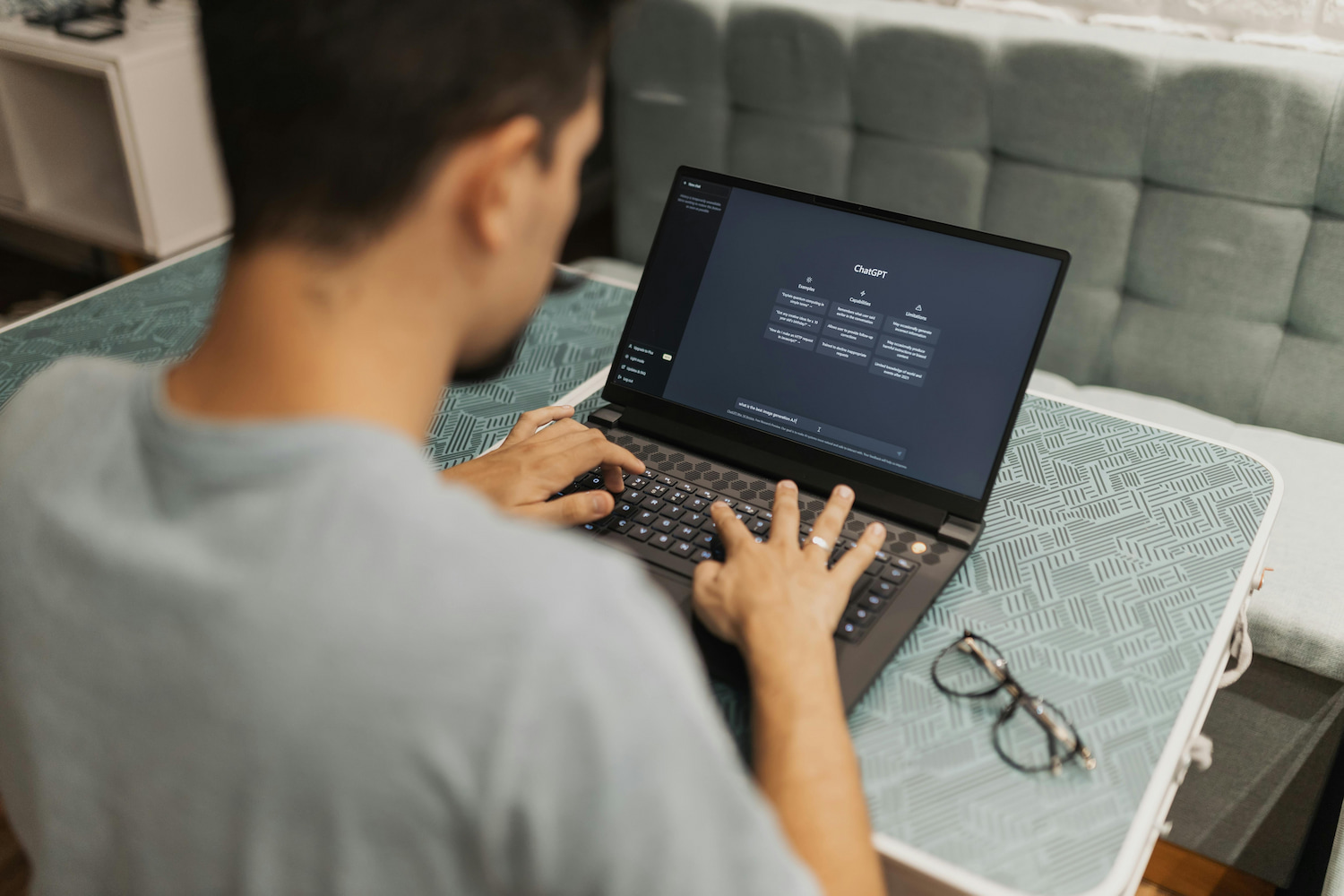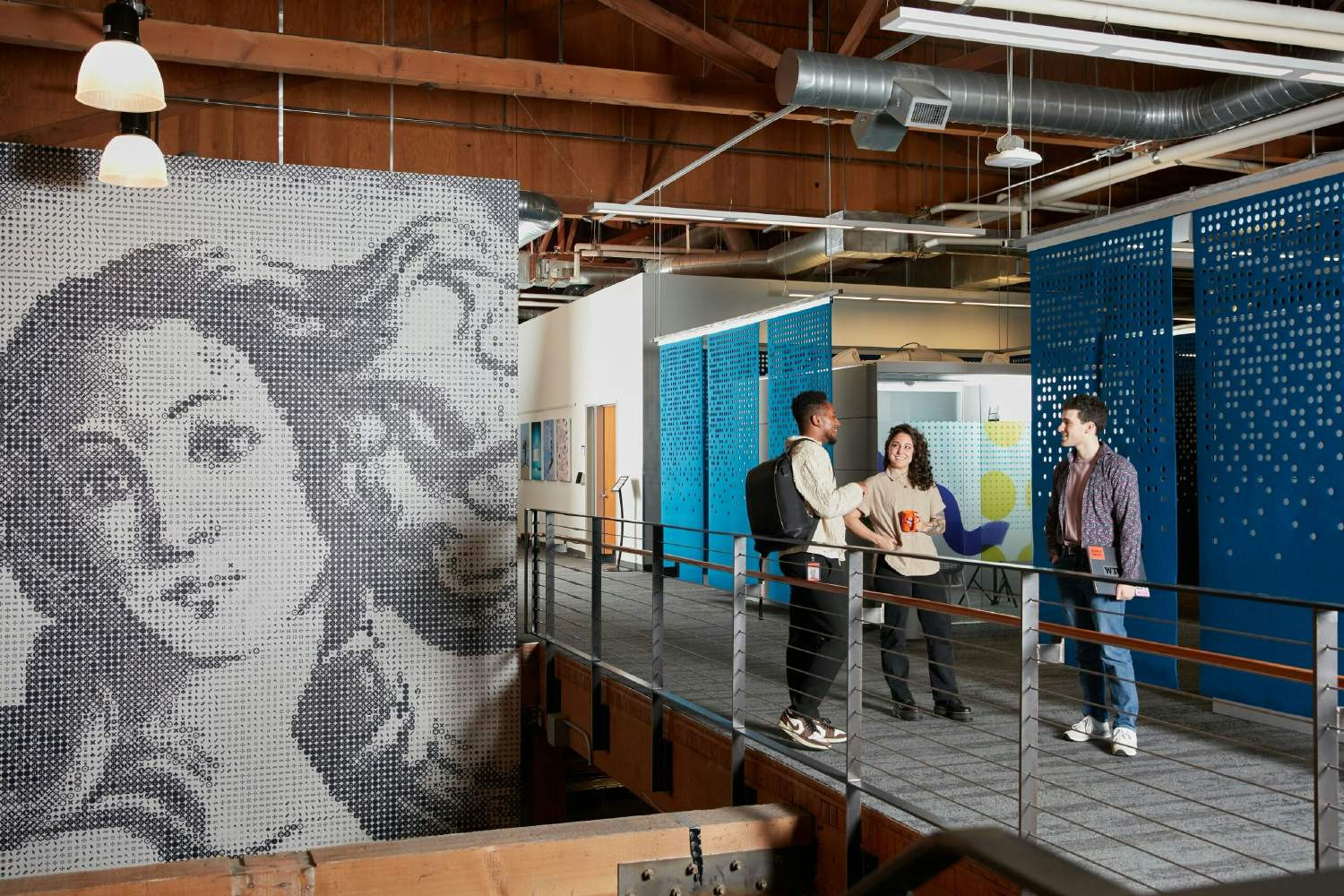AI (Artificial Intelligence), Psychological Safety, Training & Development
Jayney Howson, SVP of global learning and development at ServiceNow, joined the Better podcast to discuss how artificial intelligence (AI) in workplace learning can boost talent mobility, leadership, and overall growth in organizations. Traditionally, companies have focused on what employees should learn, but Jayney believes it's just as important to think about how they learn.
She compares the future of learning to Netflix, highlighting AI's ability to tailor content to individual needs:
“It does feel like a Netflix experience. It does know that I have shown a particular penchant for agentic AI, so it will serve me up those recommendations. But it also can see that for the job I'm doing right now, the proficiency level I've got on a skill is a one and it needs to be a four. So it serves me up that training, too. It really does deliver you that personalized experience.
AI-powered platforms like ServiceNow University personalize learning by analyzing user preferences, proficiency gaps, and job requirements. This means that a Gen Z salesperson in India would get different content recommendations than a mid-level product manager in Canada, for example.
Democratizing growth and mobility
ServiceNow University creates a “credentials wallet,” which allows employees to record skills and certifications they received through the platform, which you can share internally or externally on LinkedIn or social media.
These credentials not only position employees for success within their current roles but also open doors to new opportunities. She shares inspiring stories of early-career professionals who have used ServiceNow University to chart unexpected paths:
“People come in thinking they want to grow in sales and then end up in HR or product development.”
It also helps create for-all cultures: “ServiceNow University is open to our whole ecosystem and it creates that true mobility. So everyone is welcome and everyone can grow. We can lock everyone's superpowers, unleash all their potential, all of those great things that we talk about is true because of skilling.”
Creating a culture of psychological safety
Howson talks about how organizations thrive when employees feel empowered to take risks and embrace experimentation: “Create an environment where we can all fail fast and move on.”
She challenges companies to adapt to the shifting demands of an AI-driven world by creating “sandboxes” where employees can stretch themselves and try new approaches without fear. She says businesses embracing these cultural shifts will lead the way in talent transformation.
Advice for others: Talent transformation through data and storytelling
Howson says we should reframe the challenge leaders face: “This isn’t about learning and development. This is about talent transformation,” she says. “I think it's about leveling up the conversation from something that's about training to something that's about talent, and that conversation deserves a seat at the main table of any business.”
Her No. 1 tip: Use data and storytelling to make sure that you’re around that main table.
“Businesses that invest in talent and the AI transformation that needs to happen — they're the ones that are going to succeed.”
Roula (00:18):
Welcome to Better By Great Place to work the Global Authority on workplace culture. I'm your host, ULA Amir, content director at Great Place to Work. Today's episode is all about learning and my guest, Janie Hausen, SVP, global Learning and Development at ServiceNow made me think about learning much differently. We've always focused on what we're learning, but Janie wants us to shift our attention to how we're learning, and so we talk a lot about how she believes that effective learning should be predictive, personalized, and available exactly when you need it. Just like what happens when you watch Netflix. And this is all possible thanks to ai. Jeannie shares some great tips to help you get started. She also wants us to level up the conversation. This isn't about learning and development, it's really about transforming talent. We also discuss the role of psychological safety in all of this and learning and innovation. Spoiler. Without it, none of this can happen. Well, enjoy.
(01:33):
Chaney. Welcome to the podcast.
(01:35):
Are you originally from England?
Jayney (01:37):
I mean, I am still from England. Yeah, that's where I live. So I was born in, for anyone that knows the uk, I was born in Wales. And then yes,
Roula (01:44):
I'm I live. Okay. I was going to ask what part?
Jayney (01:46):
Yeah, Wales. And you still live there? No, I live
Roula (01:48):
Just south of London now. I love London. I spent a few summers there as a
Jayney (01:53):
Kid.
Roula (01:54):
My relatives had a place near Kensington High Street, my aunt and uncle, so I just have a soft spot for London to be just off. Kensington High Street is a very cool place to live. We were thankful guests to be able to go for the summers, that's for sure. So we are here to talk about learning and development and leadership and all those kinds of things. I think it's safe to say when most of us think about learning and development, it's not always fun, interesting or exciting. It can be compliance training or sometime at class you have to take that doesn't really actually help you develop new skills. You've said training can feel generic and we need to reimagine learning. I want to make sure I've captured how you think we should approach learning, which is to focus more on how we deliver content versus the content itself. Is that how you see it? Is that correct?
Jayney (02:43):
Yeah, no, absolutely. So I think learning should never feel like learning. That's in how I feel about it. If you think about most of us have gone through our careers and gone through life, the moments where you learn and is less likely, particularly in the corporate life to be in that formal course that you're doing in that classroom. It's the fact that you've been exposed to a new thing, you've been exposed to a new challenge, something's not gone right? And then you've learned from it. So how do we instill that same natural generative learning in formal learning? So if we as an corporation need people to learn a certain way, how do we take those human skills and bring it into the way of work? So I dunno if I agree that I don't think what you learn is important as how you learn. I think both are important, but historically we've underestimated how important it's on how you learn. So that kind of concept of it being predicted, personalized, et cetera, bringing it to you so that you never have to go to the learning, the learning is there when you need it, I think is critically important. And then you add the context of the content for whatever the growth that human needs to go through,
Roula (03:47):
Right? You need both. For sure. You need both.
Jayney (03:48):
Yeah.
Roula (03:49):
I've heard you describe it like a Netflix. I don't know if this is a pie in the sky or if you're saying this is how it can actually work. Where it's personalized to me knows what I like, it's what I don't like. It's going to make recommendations, it's going to engage me. Is that how learning and development is happening now currently or how you see it?
Jayney (04:08):
So for us, that's happening now. So I think there is still a huge part of the world and particularly corporate learning that is just you've got a library of courses that you can take, go and search the courses that you need to take. But the truth is that AI now in terms of skill recommendation, understanding of your current skills, your aspirations, the context of your job, that's all available within our data. You just need the power of a platform that be able to bring that information all surrounding you. So if you look far as we are concerned, ServiceNow and ServiceNow University is the University of Janie for me. So what I experience in that university is entirely different to what my friend Carrie might see and need on a day-to-day basis. So it does feel like a Netflix experience. It does know that I have shown a particular poncho for interest in Agen, so it will serve me up those recommendations. But it also can see that for the job I'm doing right now, the proficiency level I've got on a skill is a one and it needs to be a four. So it serves me up that training too. So it really does deliver you that personalized experience.
Roula (05:13):
So if I'm a Gen Z employee and I work in sales and I live in India, I'm getting content that looks very different than yours.
Jayney (05:22):
Yes. Yes, you should be. You should be, yes. Now I think where we can continue to innovate, all of us, and I would say all of us in the learning space, in the talent transformation space is to make sure that the content that you're providing can also be nuanced. So we provide bite-sized learning that's two minutes long because everyone has got a shorter attention span than they've ever had before, and we provide courseware that can take you three months to go through a journey. So we can do both of those things. I think what AI is giving us the ability to do though is to create even more nuances in that learning style. So I might find out actually you don't radio course at all and you don't like watching a video, but you do love a conversation with an AI coach. So we'll make sure that that comes high up in your experience so that you can engage with that coach early on.
Roula (06:06):
How do you know that?
Jayney (06:08):
Well, we can know that. You can tell us what your learning preferences are so you can tell us, but also as the data models improve so we can see your experience, then we can just serve it up based on what your previous experiences have been like just Spotify, Netflix, everything we do in our life, everything you do in your life and there is no reason, and I know that my incredible CPA would say the same thing and so would my CEO is, there is no reason that we should be compromising on our experience in our work life to what it is in our personal life. Our job at ServiceNow is to make the world work and you make the world work by meeting humans where they are across their full selves and that's making sure that experience is replicated everywhere.
Roula (06:48):
You mentioned ServiceNow University, which I believe, again, correct me if I'm wrong, it's your umbrella for all things learning and development and it's AI driven and it can suggest or match courses based on what employees want to learn. As you've just described. It can set career goals and identify skills gaps. So here's where I want to go, what skills do I need to get there? And then AI will curate that for me. What percentage of your people use ServiceNow University?
Jayney (07:14):
So all of our employees are using ServiceNow University. And the reason I say that is because, so ServiceNow University is the platform does everything that you just said really eloquently. It's predictive, it's personalized, pertinent, so you get that coach versus getting your long form learning and it's delivered to you at the point of need. That is the home of things. Like all of our compliance training as an example, is still delivered through that platform, but it's also the brand for anything which is peer-to-peer learning. We call them colabs. So groups of people learning from each other. It's all of our coaching, all of our mentoring, all of our sales training, all of our technical training, whether that be your sales onboarding or your day one training as part of your onboarding into ServiceNow. So at some point, all of our employees are within the ServiceNow University experience.
(08:00):
Now because we are obsessively delivering it at the point of need, it means that you should be getting something from ServiceNow University on a daily basis, like snippets of learning, short form learning delivered through our employee portal, which for us is called my ServiceNow. That learning is delivered to you all the time. So it's a difficult question for me to answer because it should be a hundred percent, not a hundred percent, a hundred percent at the time, but unlike a normal learning portal where someone has to go and find it and then search and you'll say it's great, we've got 30% of our people learning on it, every single employee at ServiceNow and much wider than that, our full ecosystem will be using the platform because embedded
Roula (08:38):
Into how they do work, it's embedded into everything.
Jayney (08:40):
Yeah.
Roula (08:41):
Are there any tips on how you encourage employees to use the platform or it will find them, it'll suggest things?
Jayney (08:52):
So I think it's like any ai, it's an powered platform. The more you use it, the better the experience will be. That makes sense. So the biggest tip is always that you are fully engaging with it. You're feeding into the machine that says what type of learning that you like, what skills you have, all of those things. So really leaning in to the experience is the biggest thing. I think for us though, if I were giving tips to other people and then what's important for our team is that we make sure we are as agile as possible and we are in the context and the content of that learning. So people aren't going to take something that's not useful to them in their day-to-day job. So we do need to make sure that we've got responsibility to make things useful too. Then they feed into the system and the better it can get
Roula (09:33):
And at great place to work. Of course our mission is to create a great place to work for all. And this platform should be doing that. It can do that. Can you share an example of how it has helped an employee develop skills they didn't have or find jobs they didn't know or find a job opening within the company? So our voices, everyone can rise and develop equally.
Jayney (09:55):
Yeah, I love the for all messaging and I think that's what we are all about. So the ServiceNow University concept is the university of you, so it fully understands you, but the most important thing about that is then you create this credentials wallet. So this concept that you've learned all of these skills and now I can promote the fact that I've got all of these credentials that can help me move around the company and it's completely democratized. So that can be internal, external, you can post it on LinkedIn, you can post it on social. So although we want people to move around the business, and there's so many examples, we've got some fantastic early in career examples. People come in thinking they want to grow up in sales and then end up in HR or end up in product development, end up in AI dev and the ability to build their profiles on ServiceNow University and promote themselves.
(10:39):
I'm a very, very strong believer that no one's going to set your path for you. You have to create your own path. But what ServiceNow University does is give the ability to have that wallet that they can take around with them. And we've got so many examples of that, but not just within our company externally as well. So ServiceNow University is open to our whole ecosystem and it creates that true mobility. So everyone is welcome and everyone can grow. We can lock everyone's superpowers, unleash all their potential, all of those great things that we talk about is true because of skilling.
Roula (11:09):
What would
Jayney (11:09):
Be in someone's wallet? Give me an example of what credentials. So it would be thing, so for example, right now we've got thousands of people right now today taking our micro agent cert so completely free. You can go onto the website, you can take your certificate, you do a sequence of courses, you come out of it with a badge that says that you have an identical badge, AI essentials, how to use that essentials badge that then embedded in that as a number of skills. So that says you know how to use ai, you've got experience and understanding, prompt and generic session, all is embedded in that badge and then you can take that around with you. So it's kind of like a currency in your wallet for your career.
Roula (11:48):
Got it. Okay.
Jayney (11:49):
But you'd have hundreds of those badges.
Roula (11:51):
Yeah,
Jayney (11:51):
There's thousands of courses on the platform. Every single one of those courses are credential
Roula (11:56):
And you can publicize that externally, LinkedIn, externally, LinkedIn, wherever
Jayney (11:59):
You want to go social. Yeah.
Roula (12:01):
Any tips, lessons learned, things that didn't work for other people who maybe are listening and getting expired to do something similar? This is a mass of undertaking, obviously it's using your technology and not everyone is, ServiceNow has a resourcing capability, maybe budget. I guess what would you say to that and any tips to get started? A concept on learning in the way you describe it.
Jayney (12:23):
So I think the number one thing is this isn't about learning and development. This is about talent transformation. And I think it's about leveling up the conversation from something that's about training to something that's about talent. And that conversation deserves a seat at the main table of any business. And that's the number one tip is how do you use a data and storytelling to make sure that you are around that main table and you say this is going to be the future of this business. Businesses that invest in talent and the AI transformation that needs to happen, they're the ones that are going to succeed. So I think the number one thing is how do you make sure that you get heard and get your seat to the table. The second thing I think is get your data in order. This is a data game, so how do you make sure that you've got a good understanding of the data that you need? You've got people who really understand how to map data, get it in a clean place so it can be used systematically. And then the third thing is invest in the right technology. Having the right technology stack that means work can flow easily around and transform your talent is so important. So I do those things. It doesn't need to cost the world, you just need to get started.
Roula (13:25):
The demand for tech and AI skills is through the roof and only going higher. We know we need to help employees develop AI skills and you have to re-skill your people if you want to reap the rewards of ai. There are so many surveys out there showing that employees they want more training on AI tools and skills, but they're not getting it from their companies. Of course executives think they're ready, AI ready, and employees are saying, no, we're not. You said we need to create a global playground for learning where people can experiment, test new skills, make mistakes without pressure. You described this as a sandbox environment and that sounds great, but that can't happen unless you work in a psychologically safe space. If no one is asking you for ideas or if they ask you, they don't listen to them. It's just perfunctory. And when you feel safe enough to take a risk and step outside your comfort zone, that's where innovation thrives. Most workplaces aren't great and they aren't psychologically safe.
Jayney (14:24):
No, it is so true. I strongly believe that in order for this level of talent transformation, skill transformation to happen, we do have to create a playground for learning. I think a playground is the best epitomizing of the space that you need to create. You need to create that world within a world where people feel safe to be outside their comfort zone. The reality is that leaders have got to take accountability for creating that space and that takes a ton of their own courage. If you think about if you're a leader of any company, are scared as well that what does this mean to my job? How comfortable do I feel? There was a recent report that 75% of people are scared to re-skill because they don't want to expose their skill gaps. That's true at every level in every part of the business. So I think that's creating environments that don't always feel psychologically safe.
(15:08):
So I think when you asked me earlier, what were those three steps, what are the things you'd need to get started on? I think step zero is make sure you've got that environment where people are ready to create a psychologically safe environment and what does that look like? What are the rules of the road that says these are the things that we should and shouldn't be doing to do that? I also think the one thing that we've seen and we've experienced that can be underestimated is expectations need to be really clear really early on. I think we forget a little bit as we create environments that humans respond really well with boundaries. This is what is expected for you now go and succeed. That's a really critical space and sometimes we can just miss that point. Whereas if we just said, we do expect you to use AI every single day in your job that people are like, okay, great, I'll go and do it. If they're not sure whether they're meant to or not, that creates that sense of psychological and safety. They're not sure when they're going to be succeeding or not. Same expectations super important.
Roula (16:05):
Yeah, absolutely. And I would say the 0.0 is create a high trust workplace. That's the foundation. So I think that's the point I think that we are making is that you can't have high agility, high innovation, which are essential to AI unless you have an high trust workplace
Jayney (16:25):
And where falling over is celebrated and you just brush people's knees off and they get up and try again. It has to be an environment where you can fail, where perfection isn't. The only thing that's celebrated, and I think I'm totally with you, high trusts is number one for this level of change. That's the only
Roula (16:41):
Way. We talked with Amy Edmondson on this podcast and she said something that stuck with me, which is not taking a risk is also a risk. Oh
Jayney (16:52):
So much. It's the bigger risk. It's the much bigger risk. It's just a much bigger long-term risk. There's a really beautiful book called 10, 10, 10 and the concept is when you're making a really big decision, consider what the impact is in the next 10 minutes, the next 10 months and the next 10 years. And as leaders, sometimes we can be at risk of only thinking about the next 10 minutes and sometimes the next 10 months. But that point, Amy's point in terms of risk, that long-term risk over 10 years is exponentially higher by doing nothing. But it feels incredibly scary in the next 10 minutes. So if as leaders we can all just step back and say, if I were to think 10, 10, 10, you always should be aiming on that longest term one. And what is the safest thing for me to do right now into this world? There is no option but to lean into this change, create an environment where we can all fail fast and move on. But you would agree. Most
Roula (17:41):
Leaders don't subscribe to this notion that you're describing of
Jayney (17:46):
No. Yeah, it's
Roula (17:47):
Hard. Why is that?
Jayney (17:48):
I think because everyone has their own personal fears. We're all humans at the end of the day and there's much further to fall. The higher up that you go, it's like it hurts a lot more when you fall over as an adult than a child, doesn't it? There's a reason we stop playing at a certain age and I think that's the same in leadership as well. And I think we all have a combined responsibility to create environments where everyone feels they've got that safety to fail, including the most senior leaders in the business. How do we hold them up to create an environment for such rapid amount of change? I mean it's a big ask, isn't it? But I think it's the fundamental thing that we will will be the successful failure of any business is leaders willing to create those environments
Roula (18:29):
And our data backs up what we're saying. Employees are 250% more likely to say their organization quickly adapts to change if they believe their company celebrates trying new things even if they fail. So executives, they respond to data. So you've described the why and this is the result of that. Your people will be agile, they'll adapt, they'll have new ideas if they believe we can try new things without fear of failure, they have to have that
Jayney (18:57):
Tell you today. And then what are the stories and the symbols that we can send out that tell our story? And I think that sometimes we are looking at our C-suite and saying what do they do? But there are so many people in organizations that have the pen on many of these things like if you are owner of the content or if you are owner of the marketing or within PR or internal comms, there's so many different teams that create that environment. So what if the stories that we start to tell are the stories of experiment? What if the symbols that we do is when we promote people who've been seen to try something that didn't work out perfectly? They're the people that get promoted. Those symbols and stories I think are really important to create those environments of safety.
Roula (19:34):
Yeah,
Jayney (19:35):
That's a great takeaway.
Roula (19:41):
Hey everyone, if you like listening to the podcast, then don't miss the Great Place to work for all summit in April in Las Vegas where you will learn from the best in the world, meet more than 1500 leaders and get insights on what the data says drives business success. And that is people and culture. I promise you. Leave inspired and ready to transform your workplace. Use the code better to save 20% off registration, linking coder in the bio. Don't miss out and I'll see you there. I'm going to shift our focus a bit.
Jayney (20:20):
Yeah,
Roula (20:21):
We're going to go back to May of 2020. You were diagnosed with blood cancer, stage two Hodgkin's lymphoma. You went through chemotherapy radiation and now you're in remission, which is fantastic. Yeah. Congratulations. You're now five years out. How has that experience changed your leadership? I'm sure it's changed you as a person, which is also going to impact how you lead your people.
Jayney (20:47):
So I mean, number one, I'm so blessed that I am in remission and I know that's not everyone's story, so I'm always conscious of that. But yeah, it fundamentally changed me as a human and as a leader. It's one of those clubs you don't want to be part of until you're in it and you realize it's got the best people in the world in it. And I learned a lot from the experience. And I think there's a few things. I think number one, there's just a very obvious one, but your wellness is so critically important. And I think sometimes you can be so hyper-focused on delivering in your job, delivering in your team, delivering your mission that you can miss that fact that you need to look after yourself. And I think a leader that shows that and shows that you need to take care of yourself, your physical and mental health I think is really important.
(21:29):
So I think it changed how I turn up as a leader in that way. I have a beautiful book that I was given when I was just after I was diagnosed called The Boy the Mole, the Fox and the Horse. It's beautiful book. It's British, but it's very, very famous. It's a book of illustrations and in it there's a phrase that says, imagine how we would be if we were less afraid. And I think what, when you look death in the face, which anyone that goes through a cancer diagnosis does, it makes you realize that you just don't have time to be afraid. And it makes you such a better leader if you're less afraid, if you create an environment where you feel psychologically safe, where you can take risks, where you lean on your team, where you create a space for other people to be the best version of themselves and it not be about you because you're not afraid of your own personal brand, your own personal success, you are all for the mission, all for the people, then that's how I behave when I'm less afraid.
(22:25):
And that's what I learned from that experience is I am less afraid because it's so much bigger than a job. This is about life, of course this is life. And I think for me that I hope I'm still on my own journey and I still need to continue to be a better leader every day. And I learn most about being a good leader from the people above me, but mainly from the people I lead. And I think how do you create that space where they can feel less afraid, where you can feel less afraid? And I think if anything I want to come out of that journey is that you've
Roula (22:56):
Talked about the importance of being comfortable, being uncomfortable. Did you think of this before your cancer journey? Was this your mindset and philosophy or did it make you become comfortable being in the
Jayney (23:08):
Unknown? So I think it's probably something I've always been, I like to say I have an out more courage than I have fear. I think it's a very sensitive balance that anybody has. But I know I've got all of my growth outside my comfort zone. But I think when you get something happens to you, like a diagnosis that comes out of the blue, what it does teach you is that you will get through it in whatever way, whatever the outcome is at the end. We have an incredible ability just to figure it out as humans,
(23:39):
And not just me as the person who was diagnosed, but the people around me, the team that I had to drop all the work on because I had to go and start having treatment. My husband has to go and have to look after an 18 month child on his own, those sorts of things. And people just work it out and they come out much stronger on the other side. So that concept of being forced outside your comfort zone and you grow is incredible. So I did think after that, how do you create those environments where without some terrible diagnosis happening or earth shattering thing, that you are outside your comfort zone and you can learn, which is this whole concept of this playground. And then another thing happens, and my daughter is, I've got two children. I've got a 2-year-old and a 6-year-old. And my 3-year-old, she was three at the time.
(24:21):
And we used to go to this park every single day. There was these monkey bars, I never know that's a British phrase or a we have it monkey bars. And she always avoided them. They were just out her reach. And then one day she was like, I'm going to give it a go. And over the next six months she became incredible at the monkey bars. And I was like, this is the epitomizing of being outside your comfort zone. It was perfect. They were just outside of her reach, but she could see getting there. She had a fairly responsible grownup overseeing it to make sure nothing terrible happened. The ground was pretty soft. She had friends around her who were a little bit better, who made her think that she could go a bit harder. She had people cheering her on and then she comes out stronger and more confident and happier. That is what you create. That's the sandbox, that's the sandbox, that's the playground. That's what we as organizations and leaders and learning leaders, particularly transformation leaders need to do is create that environment, which is someone's monkey bars just outside their reach that they wouldn't be able to do. Usually it's like a world within a world where you can stretch yourself. And I think if any of us reflect on anything big that's happened in our life, anything incredibly hard, we always survive pretty much always come out stronger. We
Roula (25:34):
Do. But it's when we're forced into it, when there's
Jayney (25:37):
A crisis or a
Roula (25:38):
Problem, we
Jayney (25:39):
Don't do it by choice. No, we don't do it by choice. And that's why that whole point you just said about psychological safety is it takes a huge amount for someone to go, are you sure? Are you sure it's okay for me to make this risk now because it feels like it would probably be safer for me just to carry on as I am. So you create that world within a world where people can stretch themselves. And my calling out to the world is that that safety is going to go away because the world is changing under our feet because of AI and the world of work is changing, so we are going to have to lean into it. And the companies that create those sandboxes, those playgrounds for this growth are the ones that will win that. I have no doubt in my mind about that. A
Roula (26:20):
Hundred
Jayney (26:21):
Percent, yes. Our
Roula (26:22):
Research would support that for sure.
Jayney (26:24):
Yeah.
Roula (26:25):
What advice would you go back and give your younger self?
Jayney (26:29):
Do you know what? I love this question, but I wouldn't, just wouldn't. I'd let her figure it out. She's going to be great. I had somebody showed me this image once that they had an image of themselves as a child in their pocket, and when something went well, they went, you did it, girl, you did it. And I just think she's going to be fine. She'll figure it out. Yeah,
Roula (26:49):
Yeah, she
Jayney (26:49):
Did clearly and she did, and
Roula (26:51):
We'll do. And she's still
Jayney (26:53):
Figuring it out. She's just still figuring out. I hope my tenure in the future would say the same thing to me. And actually I get a little bit scared if my tenure in the future wouldn't say that because then I'd start questioning myself. But I just think that's where danger is when we start questioning it. Yeah, it's going to be grand.
Roula (27:08):
Do you have a hobby or a passion project that gives you energy or something you want to learn?
Jayney (27:13):
Yeah,
Roula (27:13):
That's on your to-do list
Jayney (27:15):
In life. I'm mainly just obsessed with people. I just love people. I just love meeting new people and learning their stories. I always say my mom should have been a spy, except she would've revealed all the secrets. But my mom could go in a taxi with someone for five minutes and get their life story. Everything. Everything. She's incredible. She'd know that. She'd know they're in a secrets, the thing that got shame about. She's amazing. And I think I've inherited some of that. So I love listening to, I think I love podcast because I spend a lot of time listening to, because I just feel like I'm in someone's conversation and it feels like I'm learning about the human in that. So I do love, that's my passion project. But also just getting to know people and watching people fall in love with themselves. I love it.
(27:58):
I love the idea that you can have conversations and you feel somebody spark joy in their ideas and their thoughts and watching that happen, even if it's somebody in the coffee shop. I love when you make relationships with someone at a coffee shop and you're like, oh my gosh, it's the best coffee I've ever had. And they're like, oh, thank you. And then they feel a little bit of s spark. I dunno if that's a hobby. Sounds a little bit psychopathic now. I've just let it out loud. But I just love, love that human interaction
Roula (28:24):
Stuff.
Jayney (28:24):
Yeah. Maybe you are the spy, not your mom,
Roula (28:27):
Maybe. I don't know.
Jayney (28:28):
Yeah,
Roula (28:29):
Maybe. Who
Jayney (28:30):
Knows? I would not tell you if I was there, would I?
Roula (28:32):
Who knows? Honestly, I'm not asking and I'm not asking. How do you keep a sense of wellbeing
Jayney (28:36):
For yourself? Yeah, so I actually think I have because of the diagnosis and cancer feeds on stress, particularly the one I had. So I think I'm really conscious of that. I work really hard, but I love my work and I think if I ever stopped loving it, then I think I've got a really good relationship with working that I would stop. So I think that's a good thing. But I also just have some hacks. I exercise every single day. I would never,
Roula (29:01):
Every single day.
Jayney (29:03):
I currently have a 630 day streak on Peloton, which I'm terrified about losing. I'm really scared about losing it. But I do cheat some days. Sometimes I meditate. But the idea that, but I do need to, that's probably not very healthy though. No, I've just said that out loud, that obsession with the streak. But I do try and have to exercise every day. I get outside, I walk my girls. If I'm not traveling, I will put my girls to bed. I will take them to school every day. I just want to be present in the world as much as I can. And I have an obsession. Everyone, you've heard this, another podcast. I have a session with trees. I just think they're the most beautiful thing. You just walk at the moment. My favorite time of the year is spring if you're walking around. And I have the last couple of years with my daughters, I've been like, are the flowers coming here? And then you watch them emerge. Oh, it's beautiful. That's how I keep my mind sane.
Roula (29:55):
I'm going to ask you for a book or a podcast you recommend, but one podcast I recommend, it's a certain episode. I mean, not to be a downer, but it's Anderson Cooper's podcast, I think it's called All There Is, and it's on Grief. And he had Andrew Garfield on and how he talks about trees. So Andrew Garfield, his mom passed away and he talks about the power of trees and healing him and nature. It is really powerful.
Jayney (30:24):
Oh, I'm going to listen to it.
Roula (30:25):
Yeah, it is
Jayney (30:25):
Uplifting. This is a true fact. I promise. I woke up the day after the way I was diagnosed was not great. It was beginning of the pandemic. Things have gone a little bit wrong in the system, so I kind of find out by accident wasn't great. So I woke up the next morning and it was all a bit turmoil as you can imagine. And I was sad. I was making a cup of tea and looking out the window and I had this flat that had beautiful look over the British countryside. It was beautiful. And I thought, do you know what I'm going to miss? I'm going to miss my husband. I'm miss my baby if this doesn't work out, but I'm just going to miss how beautiful those trees are. And they were just so beautiful. And it's like I'd never seen them before. And I just think there's this kind of, I do believe in that, the healing fact that there's just this longevity in it and just really grounds you in how small you are in the world.
Roula (31:10):
It's
Jayney (31:11):
Just beautiful. I'm going to listen to that podcast.
Roula (31:12):
Yes, yes. I'll send you the episode. Yeah, it's really good. What did you want to be when you grew
Jayney (31:19):
Up? I wanted to be an actress and man, I think I'm still pretty much doing that. I remember I did Bugsy Malone when I was a kid and I can remember being on stage and doing the Square G Gum thing at the end, I'm thinking, I've never been this happy in my life. Oh my gosh. I was just like, I'd never been so old happy. I was like 11. And I think I'd been pretty unhappy, but I was just so happy and people were clapping and we were all having fun. I was like, oh my God, this is how it needs to be. And I dunno how if it was as much the acting or the delivering something beautiful as a team and being part of something incredible. And I actually think we just made the audience so happy. And I just love that. And I think I have brought that into my life, I hope. Yeah,
Roula (32:05):
I would agree. I'm sure you do. You've mentioned a couple books already today. You mentioned you really like podcasts. Is there another book or a podcast you'd recommend to people?
Jayney (32:15):
So many. So Song of Significance, Seth Godin is a really, really good book. It's all about, do you know? So when the Queen Bee gives birth to the next queen bee, she knows that she needs to leave the hive. So what they do is just before it hatches, the queen bee takes 10,000 of their bets, leaves the hive, and then leaves the hive that they had set up for the new queen bee to take. And that movement of bees going is called the Song of Abundance because you can actually hear it. 10,000 bees moving away. What they do is they move and they don't have anywhere to go. It's amazing. Thousands of these bees led by this queen, and they go and hunker in a tree and they have 48 hours to find a new home before they all die. They just keep warm by buzzing together.
(32:59):
And what they do is they send worker bees out to go and they're bees so they can't talk to each other. They go and go out and they go and look at these different new homes and they come back and they do a little bee dance. No one on the podcast can see this, but I'm doing a little bee dance. They do a little bee dance. And then based on that dance, thousands of bees trust these one or two bees scout bees to go into their new home. And 98% of those hives survive based on just one or two bees communicating through that. And that is what powerful leadership looks like. That's what leading through change is like this one hive of individuals who are believing with a purpose and having faith in these people to go and find the future who are testing it and failing. And the whole book is about what does that look like in leading cultures inspired by bees, which are incredible. So there you go. That's a great book. Have I sold it?
Roula (33:48):
You are in the Right Career. Well, we started talking about leadership and we'll end there. Thank you, Janie, it was great to have you on. I really enjoyed the conversation.
Jayney (33:57):
Thank you so much.
Roula (34:00):
Thanks for listening. If you enjoyed today's podcast, please leave a five star rating, write a review, and subscribe so you don't miss an episode. You can stream this in previous episodes wherever podcasts are available.
Get recognized for your culture
Gain accolades for your workplace environment and attract top talent who share your values.


